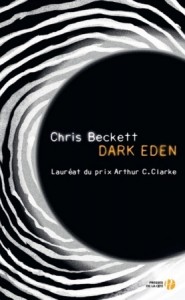Here’s a short Q & A that the US publishers (Broadway) did with me for Mother of Eden:
1. The protagonist of Mother of Eden is a headstrong, determined young woman named Starlight Brooking, who brings about huge changes in society around her throughout the course of the novel, ending up as a truly revolutionary figure. Did you make a conscious decision to have a female protagonist? What is the role of female characters in science fiction in general, and has that changed over the years?
I guess as a writer, one tends to default to viewpoint characters who are a bit like yourself. Well, I know that’s true of me anyway, and so I make a conscious effort to try and develop main characters who are different. John Redlantern, in Dark Eden, while male, was unlike me in that he is very much a doer: someone who must be constantly on the go in order to feel alive. (This really isn’t me at all! I’m very good at doing nothing!)
Given that the protagonists of all my novels, and the majority of my short stories, had been men, I decided that it was about time I wrote a novel with a female main protagonist. In fact Starlight is female and a doer. (She’s also less than half my age, but this is common for my characters. I don’t seem to have done with that time of life!)
I like Starlight as a character. Others will have to judge of course, but, apart from that first little conscious effort of choosing a female protagonist, I didn’t find it hard to write from her perspective. Then again, I have three sisters (no brothers), two daughters, a mother, a wife, women friends, and I have worked most of life in a profession which is 85% women. If I’ve being paying attention at all, I really ought to be able to describe things from a women’s perspective!
As the book developed, it became increasingly about women too. As in Dark Eden, the story is told by a number of different people and, at one point I thought of having only women as viewpoint characters. In the end, although most of the viewpoint characters are women (Starlight, Glitterfish, Julie, Quietstream, Lucy…), I did include two men: the gentle Greenstone, and the brutal Snowleopard.
I am sure that most of the science fiction I read growing up in the seventies was (a) written by men, and (b) had men as main characters, with women mainly present as objects of love and desire. I think SF has moved on from that, thank goodness. However it does strike me that we are still better in SF at writing about tough male and female protagonists acting in stereotypically “masculine” ways, than we are at writing about people (men or women), who are gentle and nurturing in stereotypically “feminine” ways. I think that’s something to think about. After all, we need nurses and teachers at least as much as we need soldiers and atomic scientists, and I would say a good deal more so.*
2. Mother of Eden has so much to say, as Dark Eden did, about how civilizations develop and the sacrifices we make in the process. Did you start with certain issues that you wanted to address, or did those come naturally as you wrote the novel?
Well, both. I think the content of this book flowed naturally from Dark Eden, and some basic themes were certainly there in my mind from the beginning. But new themes and ideas emerged as I went along.
In Dark Eden, I showed a society that was becoming increasingly dominated by men, and increasingly controlled by violence. I knew from the beginning I wanted to think about how that developed. In Mother of Eden, the followers of David and the followers of John have created two hierarchical, militarized and male-dominated societies (a description which, of course, would still fit most of the societies on Earth today). However in both societies, there persists a folk memory of the time when the whole human community of Eden was a single family in which the central figure was a woman. (I think this is also true for most of us on Earth today: most of us grew up in an environment in which a woman was the dominant figure, our primary source of nourishment and comfort and safety, insofar as we had these things at all). Even in these male-dominated societies, it seemed to me, women still had immense power, and men, afraid of this power, had tried to channel and control it in various ways to make it serve their purposes. Gela’s ring, which Starlight puts on her finger, became a focal point for a lot of my thinking about this.
Something that emerged as a theme as I went along was power more generally. Not just men’s power and women’s power, but power itself: what it is, where it comes from, what you have to do to get it.
Another theme, that was of course present in Dark Eden also, is our relationship with the past. Now of course, the story of Dark Eden is itself the past, and we have two different societies whose enmity is based on their different takes on the meaning of those events, much as (for example) the enmity between Sunni and Shi’ite Muslims in the world today is a continuation of a quarrel that goes back to the eighth century.
As to the sacrifices we make in order to progress, yes this remains a big theme in this book. I am struck by the idea that every human society is a kind of compromise. To get one thing, we have to give up another. There is always a price for everything, it seems to me. This means that if you want easy answers, or comforting messages about how one day everything will all be wonderful, then I’m not the person to come to! I guess if I had an easy answer, I wouldn’t be writing novels!
3. Mother of Eden takes place 200 years after the events of Dark Eden. How did you decide which changes would have taken place in that time? How has the language changed as the inhabitants of Eden have lived there over the decades?
The decisions you make when writing a book of this kind are always a compromise between realism and what works for the story. I did not make major additional changes to the language, over and above those made in Dark Eden, because I didn’t want to make things too difficult for the reader, but I tried to give some sense of the fact that geographical dispersal has meant that people in Eden no longer speak a single dialect but several different ones which would, in the fullness of time, become separate and mutually incomprehensible languages. I also tried to show how new words would have to be reinvented when old words had been lost. In Dark Eden, having lost the words “sea” and “ocean”, but having retained the word “pool”, John and his followers give the name Worldpool to the large body of water they found on the far side of Snowy Dark. In Mother of Eden, the institution of marriage having been forgotten, new words have had to be invented as something like marriage has re-emerged in both of the main societies. Likewise, since the word “servant” ceased to exist in the relatively egalitarian early days, new words have had to be found to describe people who perform that kind of function in the new near-feudal hierarchies that have emerged.
In relation to society more generally, I just tried to think of the way the dynamic at the end of Dark Eden would lead: an expanding population, enormous new territories, competing leaders and ideas…
4. On a related note, can you describe your process of world-building? How did you go about creating the world of Eden—and even beyond that, imbuing it with a sense of history and tradition? I was struck by how the characters act when they go to Veeklehouse, the same way we might act about seeing a monument today. What’s the process of taking a basic human reaction like that and translating it to a totally foreign environment?
Well of course, that’s an old theme in SF: estrangement, things from the present seen in a new light in the completely different context of the future… And it’s a universal human experience too, isn’t it? Human bodies and minds come and go, but our artifacts may continue for hundreds or thousands of years, as a kind of ghostly reminder that things were not always like this, and won’t always be like this in the future. I live in Cambridge, for instance, in the part of England known as East Anglia and every week or so I walk my dogs along the top of a dyke built a millennium and a half ago to protect the Kingdom of the East Angles against invaders from the West. You can’t know the names of the people who built it, or what was going through their minds as they worked. That’s all gone for good. Yet the dyke remains stubbornly there.
My world-building takes as it starting point my thoughts about the world I actually find myself in and the dynamic that led it to be that way. One thing I try to avoid is going for continual novelty. I don’t want to overload my world with wonders. Of course, I take all kinds of liberties, and yet I want my worlds to feel like worlds and not like theme parks.
5. You’ve written before on the distinctions between literary fiction and science fiction, or “genre fiction” as a whole—including a piece last year for The Atlantic. Why do you think it’s so important to debunk these stereotypes?
Well, my motive is basically selfish. I don’t want people thinking that my stuff is ‘just science fiction’ and therefore not worth taking seriously. I can’t judge the merits of my own work, but I do know it deals with the same range of issues and concerns as any other branch of fiction, and I’d like that to be recognized.
As I’ve said many times before, all fiction involves making stuff up –making up characters, making up situations– in order to be able to explore aspects of life that might otherwise be impossible to reach. (After all, imagination is needed just to put yourself into the head of a person other than yourself.) Science fiction’s one defining feature is that, as well as inventing characters and situations, it also invents worlds that are in some way different from the one we actually know. It’s just another strategy that can used to generate stories, one among many, and I refuse to believe that the mere presence or otherwise of this strategy is reliable indicator of the quality or seriousness of a book. SF can be brilliant, good, bad and terrible, but then so can love stories, or war stories, or stories set in the past…
*More extended thoughts on this theme can be found here in a post I called ‘An unsung Einstein’.


